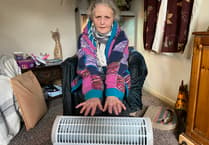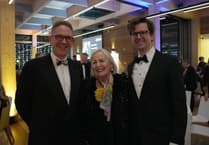A SWEDISH-born stallion has made a ‘donation’ to a gene bank campaign set up by the Exmoor Pony Society (EPS) to help secure the future of the UK’s oldest native breed.
The society is more than half-way to raising £100,000 needed to fund the gene bank campaign.
The campaign will collect semen from selected stallions to be stored in a gene bank of cryogenically-preserved genetic material which could safeguard the breed in the event of disaster.
Society chairman Nigel Hill, Chairman said: “The Exmoor pony is one of the most iconic native breeds in the UK and it is our role to safeguard its future.
“As a ‘priority’ breed according to the Rare Breeds Survival Trust they are essentially endangered.
“In order to reach the minimum quantity to provide breed ‘catastrophe insurance’, ideally 25 stallions need to contribute.
“We aim to achieve this within two to three years and are actively raising funds to make this possible.”

The first semen ‘donation’ was taken from stallion Elsinore Alan Partridge last spring.
Now, a second pony, 19-year-old stallion Apple’s Original, owned by Maddy Buttner, of Bristol, has successfully ‘donated’ sperm.
Original lives in a private nature reserve on Exmoor, where he is thriving as free-roaming conservation grazer.
However, he was bred by Louise Rundell at the Apple stud in Vårgårda, Sweden, and his birthplace has proved to be important.
With a history of registered Exmoor ponies exported from the UK to Sweden, notably in the 1960s, 70s, and 90s, the Swedish Exmoor Pony Society is a daughter society of the UK group and follows the same rules for registration.
Ecologist Sue Baker, a member of EPS’s scientific advisory panel, said: “Original carries some bloodlines that have become scarce in the UK.
“Those interested in increasing the number of ponies carrying these genes realised over a decade ago that importing a stallion from Sweden was crucial.
“So, in 2010, Original was brought to the UK when he was just six years old
“In 2013 his first UK-sired foal was born as part of owner Maddy Buttner’s breeding programme, and his 2023 companion has been confirmed in foal.”
Louise started breeding Exmoor ponies in 1990 and has bred 40 foals, all registered in the EPS stud book.
To date, nine ponies have been sired by Apple’s Original.
Ms Baker said: “Having been born ‘'in-ground’ at a stud and riding school, he is very easy to handle, which is a great advantage for the gene bank project.
“For obvious reasons, unhandled free-living stallions are not candidates for donation.”
Original was registered as purebred in the stud book following an inspection by EPS as a two-year-old, and was also approved by the Swedish stallion judging committee.
He went on to win a number of competitions and formed a close bond with Louise, who said: “When we were going to the breed show in southern Sweden in 2008 I was told that some people from England were on their way there to look at him.
“Then, I saw it clearly, he was moving on in life.
“He had a greater mission to perform.
“It is very difficult to let go of something so loved and beautiful.
“I will never forget the day he left.
“But I will also never forget the day he met me on Exmoor.
“I have had the pleasure of meeting him many times on Exmoor since, and we always have our chat and cuddle.
“That he would then be selected and given this important assignment for the future, I could never dream of.

“It is fantastic. I am so happy, proud, and humbled that Original contributed and that we, two-legged, have made it possible.”
Current owner, Maddy Buttner, believes the gene bank campaign is vital.
She said: “Safeguarding the gene pool for the future is a big and bold undertaking.
“As a breeder, my interest has always been the under-represented bloodlines within the breed, hence putting the effort into bringing critical lines back to the UK by importing Original.
“So, I am beyond delighted that he has been chosen to be one of the first stallions to participate in the project.
“It has been a real team effort getting him to the donation centre, as the logistics for a free-living pony are considerably more challenging than for an in-ground one.
“Thanks to all involved in making it happen, because I could not have done this on my own.
“I am so pleased that his genes are going into the gene bank to help safeguard his breed features for the future.”
Anybody who wants to support the gene bank campaign can find more details here.




